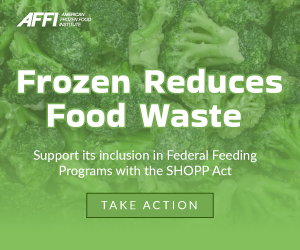Arlington, Va. – Donna Garren, Ph.D., American Frozen Food Institute (AFFI) Executive Vice President for Science and Policy, provided comments to the U.S. Departments of Health & Human Services (HHS) and Agriculture (USDA) on the Scientific Report of the 2020 Dietary Guidelines Advisory Committee. This was the first opportunity to comment in person to the Departments since the 2020 DGAC submitted its final report in July. Dr. Garren’s comments to HHS and USDA focused on the following three main imperatives:
1) Facilitate all Americans in adopting healthy eating patterns.
“Perhaps the most important public health goal is to support consumers in meeting fruit and vegetable recommendations. This is punctuated by the statistic in this DGAC report that 9 in 10 of all Americans do not eat the recommended amounts of fruits and vegetables and that higher fruit and vegetable consumption is associated with lower levels of obesity,” said Garren.
2) Increase intake of fruits and vegetables, starting early in life.
“Across the lifespan, mean energy intake among children ages 1 to 18 y was significantly lower among those who ate frozen fruits and vegetables,” Garren stated. Frozen foods have a key role to play in helping Americans meet fruit and vegetable recommendations, maintain a healthy weight, achieve better diet quality while being affordable and consumption results in minimal food waste,” Garren added.
3) Address common misconceptions about frozen foods.
“Menu modeling shows that diets that include 95 percent frozen foods can meet MyPlate food group recommendations for grains, fruits, and vegetables, as well as nutrient recommendations for calories, fat, saturated fat, sodium, fiber, vitamin A, vitamin C, and calcium. Further, NHANES data indicates that frozen fruit and vegetable consumers not only eat more fruits and vegetables overall, but also have diets higher in fiber, potassium, calcium, and vitamin D compared to non-consumers.
“We are in an unprecedented period in our history from a public health and food security perspective. Historically, frozen foods have been an indispensable source of affordable and non-perishable nutrients, but especially during the COVID-19 pandemic. It is critical that future dietary policies do not limit options when supporting consumers in eating healthfully. Rather, consumers should be encouraged to make healthful choices in the frozen food aisle, particularly given the critical role that frozen foods play in helping consumers get closer to DGA nutrition recommendations,” Garren added in her closing remarks.
AFFI’s written comments will be submitted Thursday, August 13, 2020.




